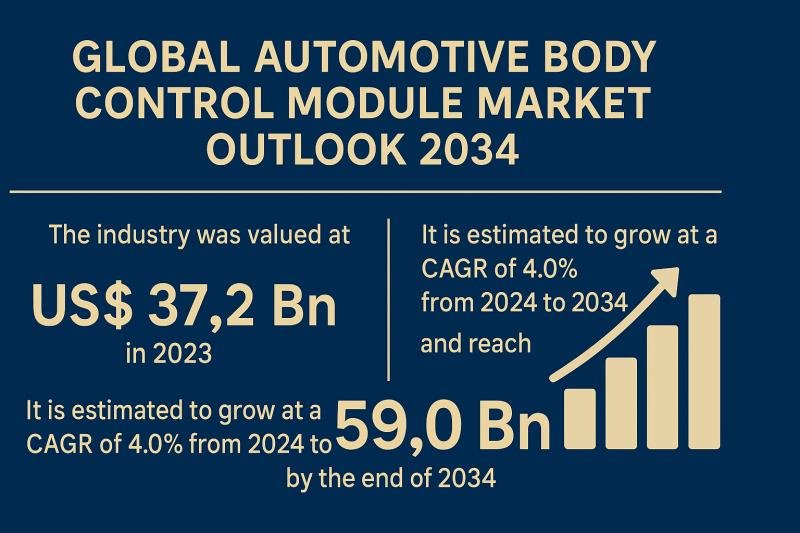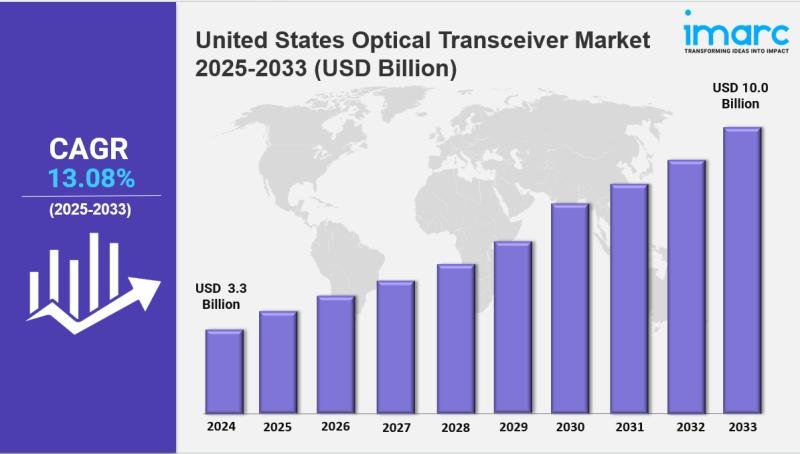Automotive Body Control Module Market Outlook 2034
The global automotive body control module market was valued at US$ 37.2 Billion in 2023 and is expected to reach US$ 59.0 Billion by 2034, growing at a CAGR of 4.0% from 2024 to 2034. Increasing demand for advanced vehicle electronics, comfort features, and safety systems is driving market growth. Body control modules play a critical role in managing various electrical components, including lighting, windows, and security. The rise in electric and autonomous vehicles is further boosting the need for sophisticated control systems.
🧠 Enable smarter, safer, and more efficient vehicle control
👉 Request your sample report copynow @ https://www.transparencymarketresearch.com/sample/sample.php?flag=S&rep_id=36311
Market Overview
The automotive body control module (BCM) is a crucial electronic control unit that governs and manages a wide range of vehicle body electronics, including lighting, power windows, immobilizer systems, HVAC, central locking, wipers, and seat adjustments. As the shift toward vehicle electrification and automation accelerates, BCMs are evolving to become smarter, more integrated, and capable of handling more complex tasks.
Modern vehicles-especially electric and premium-class models-rely heavily on BCMs to enable comfort, convenience, and personalization features. The growing use of embedded electronics, vehicle-to-everything (V2X) communication, and centralized architecture is further increasing BCM adoption.
Market Description
A body control module functions as a central processing unit for vehicle body electronics. It communicates with various sensors, switches, actuators, and other ECUs using CAN, LIN, and Ethernet protocols. BCMs allow for centralized control, diagnostics, and monitoring, contributing to improved vehicle performance and user experience.
BCMs play a vital role in enabling advanced features such as:
• Keyless entry and engine start
• Adaptive lighting systems
• Remote diagnostics
• Advanced driver-assistance systems (ADAS) integration
• Comfort and infotainment personalization
The trend toward zone-based and domain centralized architecture is further increasing the role and complexity of BCMs in next-gen vehicle platforms.
Analysis of Key Players
Vendors in the automotive body control module (BCM) market are increasingly focusing on the development of advanced BCMs, particularly for commercial vehicles. These modules are essential for managing and monitoring a wide range of functions such as tire pressure monitoring, rain-sensing wipers, interior lighting control, and ambient light sensing-all of which are critical for enhancing vehicle safety, comfort, and energy efficiency.
To meet growing demand and reduce dependency on global supply chains, many companies are also prioritizing localized production. The introduction of state-of-the-art Surface Mount Technology (SMT) lines is enabling higher output capacity, improved integration, and reduced time-to-market for BCMs.
Key players in the global automotive body control module market include:
• Robert Bosch GmbH
• Continental AG
• HELLA GmbH & Co. KGaA (FORVIA)
• ZF Friedrichshafen AG
• Magna International Inc.
• Denso Corporation
• Lear Corporation
• Delphi Technologies (BorgWarner Inc.)
• Mitsubishi Electric Corporation
• Nidec Corporation
• Valeo SA
• Marelli Holdings Co., Ltd.
• Hitachi Astemo, Ltd.
• Hyundai Mobis Co., Ltd.
• Texas Instruments Incorporated
These companies have been profiled in the market report based on key parameters such as company overview, business strategies, financial performance, product portfolio, business segments, and recent innovations.
Key Developments in the Automotive Body Control Module Market
• February 2024: Lear Corporation participated in a fireside chat at the Wolfe Research Global Auto and Auto Tech Conference held in New York. The company showcased its vision for advanced electronics architecture, including smart BCM innovations tailored for the evolving needs of electric and connected vehicles.
• 2023: Renesas Electronics Corporation announced its roadmap for next-generation System-on-Chips (SoCs) and Microcontrollers (MCUs) aimed at all key applications in the automotive digital domain. These include solutions optimized for BCM integration, enabling higher functionality, lower power consumption, and enhanced data processing capabilities for future vehicles.
Key Player Strategies
⚙️ Integration with Central Computing Platforms
Top companies are developing modular and scalable BCMs compatible with centralized E/E architecture for SDVs (software-defined vehicles).
🔋 EV-Centric Development
Suppliers are designing energy-efficient BCMs optimized for battery management and auxiliary system control in electric vehicles.
🌍 Regional Manufacturing Expansion
Key players are expanding production facilities in Asia-Pacific and Eastern Europe to serve rising regional demand cost-effectively.
🧠 AI-Driven BCM Functions
Some OEMs are integrating edge computing and AI into BCMs to support dynamic personalization and predictive maintenance features.
🔄 OTA Update Capability
BCMs are now being built with over-the-air update compatibility, enhancing cybersecurity and reducing recall-related costs.
📌 Explore strategies and forecasts in our sample report copy@ https://www.transparencymarketresearch.com/sample/sample.php?flag=S&rep_id=36311
Challenges
• Complex Software Integration: Increasing vehicle functionality makes software integration and validation in BCMs more complex.
• Cybersecurity Risks: BCMs are critical points of vulnerability in connected vehicles and require advanced encryption and threat mitigation.
• Standardization and Interoperability: Variability in communication protocols and architecture complicates cross-platform development.
• Thermal Management: As BCMs handle more functions, thermal management becomes critical to prevent overheating and system failure.
• High Development Costs: Meeting OEM demands for advanced and reliable modules leads to increased R&D investments.
Opportunities
🚗 Rise of Electric and Autonomous Vehicles
EVs and autonomous platforms need centralized, low-latency control systems-creating high-value applications for BCMs.
🏙️ Connected Car Ecosystem
Integration with telematics, infotainment, and mobile applications opens opportunities for smart BCMs with cloud connectivity.
🔄 Over-the-Air Update Capability
Enabling remote software and firmware updates through BCMs enhances customer satisfaction and reduces service costs.
🌍 Emerging Markets Growth
Asia-Pacific, Latin America, and the Middle East & Africa present massive aftermarket and OEM opportunities due to rising vehicle ownership.
📊 Fleet Management & Diagnostics
Fleet operators are adopting BCMs to enable real-time diagnostics, improve uptime, and enable data-driven operational decisions.
Market Segmentations
➤ By Type
• CAN-based BCMs
• LIN-based BCMs
• Ethernet-based BCMs
• Others (FlexRay, MOST)
➤ By Application
• Interior Controls (Windows, Locks, Seats, Lighting)
• Exterior Controls (Headlights, Wipers, Mirrors)
• Security & Safety Systems
• HVAC Control
• Infotainment & Comfort Features
➤ By Vehicle Type
• Passenger Vehicles
• Light Commercial Vehicles (LCVs)
• Heavy Commercial Vehicles (HCVs)
• Electric Vehicles (EVs)
➤ By Sales Channel
• OEM
• Aftermarket
➤ By Region
• Asia-Pacific: Dominates with high vehicle production and rising electronics integration.
• Europe: Growth driven by luxury and electric vehicle demand.
• North America: Mature market with emphasis on ADAS and safety features.
• Latin America & MEA: Emerging demand from expanding automotive manufacturing base.
Why Buy This Report?
✅ Comprehensive Industry Intelligence
Understand key trends driving growth in automotive electronics and BCM technologies.
✅ Detailed Market Segmentation
Explore performance metrics across multiple BCM types, vehicle classes, applications, and geographies.
✅ Competitive Benchmarking
Stay ahead of the curve with insights into major players’ product portfolios, expansion strategies, and M&A activities.
✅ Technology Trends & Forecasts
Gain foresight into innovations in communication protocols, cybersecurity, and centralized architectures.
✅ Regulatory and Standards Insight
Understand how global safety, emissions, and data protection standards are shaping BCM development.
✅ Actionable Insights for Strategic Planning
From R&D priorities to sourcing decisions, leverage real-world recommendations to drive value.
💼 Get ready to lead in connected, electric, and software-defined vehicle platforms
👉 Purchase the full report now @ https://www.transparencymarketresearch.com/checkout.php?rep_id=36311<ype=S
Conclusion
The automotive body control module market is experiencing significant transformation, driven by megatrends such as vehicle electrification, software-defined architecture, and increasing consumer demand for advanced features. BCMs are evolving from basic control units to intelligent, integrated hubs capable of managing complex systems across the vehicle body.
With OEMs transitioning toward centralized domain controllers, BCMs will continue to play a pivotal role in delivering functional safety, comfort, and digital services. Companies that invest in scalable designs, cyber-secure frameworks, and cross-domain integration are best positioned to succeed in this rapidly evolving market.
This report offers a complete strategic outlook for stakeholders, enabling informed decisions across product development, partnerships, sourcing, and market entry.
More Trending Research Reports-
• Automotive Speaker Market – https://www.transparencymarketresearch.com/automotive-speaker-market.html
• Vehicle Headlight Control Module Market – https://www.transparencymarketresearch.com/vehicle-headlight-control-module-market.html
• Electric Vehicle Wiring Harness Market – https://www.transparencymarketresearch.com/electric-vehicle-wiring-harness-market.html
• Electric Vehicle Test Equipment Market – https://www.transparencymarketresearch.com/electric-vehicle-test-equipment-market.html
• Bus Chassis Market in RHD Countries – https://www.transparencymarketresearch.com/bus-chassis-market-in-rhd-countries.html
About Us Transparency Market Research
Transparency Market Research, a global market research company registered at Wilmington, Delaware, United States, provides custom research and consulting services. The firm scrutinizes factors shaping the dynamics of demand in various markets. The insights and perspectives on the markets evaluate opportunities in various segments. The opportunities in the segments based on source, application, demographics, sales channel, and end-use are analysed, which will determine growth in the markets over the next decade.
Our exclusive blend of quantitative forecasting and trends analysis provides forward-looking insights for thousands of decision-makers, made possible by experienced teams of Analysts, Researchers, and Consultants. The proprietary data sources and various tools & techniques we use always reflect the latest trends and information. With a broad research and analysis capability, Transparency Market Research employs rigorous primary and secondary research techniques in all of its business reports.
Contact Us
Transparency Market Research Inc.
CORPORATE HEADQUARTER DOWNTOWN,
1000 N. West Street,
Suite 1200, Wilmington, Delaware 19801 USA
Tel: +1-518-618-1030
USA – Canada Toll Free: 866-552-3453
Website: https://www.transparencymarketresearch.com
Blog: https://tmrblog.com
Email: sales@transparencymarketresearch.com
This release was published on openPR.




